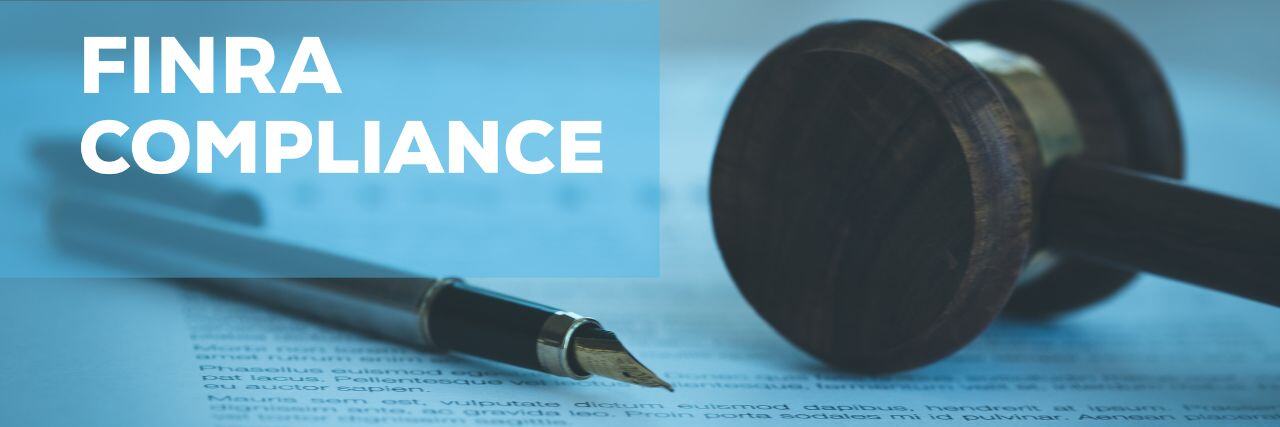Compliance in Finance: What is FINRA Compliance?
July 11th, 2024 | 3 min. read

Are you overwhelmed by the enormous amount of financial regulations you need to follow? Do you find it challenging to stay compliant with FINRA regulations while juggling everything else about your business?
You’re not alone.
Navigating the complex world of financial compliance is daunting.
But don’t worry.
As a managed services provider (MSP) with years of experience helping companies with their compliance needs, we promise to provide clear information. We also invited Sean Harris, ITS Senior VP for Cybersecurity, to help explain:
- What is FINRA compliance?
- What are the components of FINRA?
- What are the common FINRA compliance challenges (+ solutions)?
All this information will help simplify your business’s FINRA compliance. By the end of this article, you’ll be on your way to achieving and maintaining FINRA compliance.

What is FINRA Compliance?
FINRA (Financial Industry Regulatory Authority) plays a vital role in regulating securities firms operating in the United States. They’re a non-profit SEC-partnered organization dedicated to “protecting the investing public against fraud and bad practices."
Compliance with FINRA rules is mandatory for all member firms to uphold market integrity and protect investors.
Non-compliance can result in severe consequences, including hefty fines, reputational damage, and even loss of license.
However, FINRA compliance is also largely self-regulatory.
“It reminds me of HIPAA or the FTC safeguards,” Harris said. “It is stating things that are best practices. It’s still self-regulating; it is its own thing. Most of the time, it would require a whistleblower to bring the non-compliance to the attention of the regulator.”
But if you plan to become – or already are – a larger financial institution, you must take FINRA compliance seriously.
“Firms must be registered with FINRA to legally sell securities, provide investment advice, and engage in various other financial activities,” Harris explained.

What are the Key Components of FINRA Compliance?
So, what are the standards and practices financial institutions need to follow?
1. Registration and licensing
FINRA mandates that individuals and firms involved in the securities industry register with the authority and obtain the necessary licenses.
2. Recordkeeping and reporting
Compliance with FINRA regulations entails meticulous recordkeeping and timely reporting of various activities, including transactions, communications, and customer complaints.
These accurate records help regulators check that the firm is doing its job properly.
3. Supervision and surveillance
Each organization should create and maintain a set of rules to supervise their staff’s activities. These rules should ensure everyone follows the laws and regulations related to trading securities.
Firms also need to assign at least one staff member to take ownership of FINRA compliance in the organization. This person is responsible for ensuring the firm’s rules are followed.
Plus, there should be a clear rule book for supervising their activities, with consideration for the firm’s specific business needs.
4. Cybersecurity and data protection
With the increasing threat of cyber-attacks and data breaches, setting up cybersecurity systems is a non-negotiable part of FINRA compliance.
“If you choose and work toward a framework such as CIS controls, NIST CSF, or NIST 800-53, you will meet all the requirements that FINRA has for cybersecurity,” Harris explained.
Firms must also implement a system to watch over and check the activities of their staff. This system should ensure everything is done correctly and according to the rules.

What are the Common FINRA Compliance Challenges (+ Solutions)?
Here are some obstacles financial institutions often face with FINRA compliance and what you can do to overcome them:
1. Complexity
Compliance – whether to FINRA rules, HIPAA, or other regulations – is complicated. You have multiple moving parts to coordinate on top of everything you’re already doing for your business. In fact, Deloitte found out more than 40% of folks in finance say compliance is their top headache.
So, what are your options?
You can ramp up your hiring process to get specialized compliance staff, train your team and buy the tech you need, or outsource the entire process to a third-party compliance expert specializing in those regulations.
2. Resource constraints
Short on people or cash for all your compliance needs? This is a common issue, especially for smaller firms. The best way to deal with this issue is to hire outside help and lean on automated tools to keep things under control and costs low.
Hiring outside help, such as compliance consultants or specialized firms, can provide the expertise you need without the overhead of full-time employees. Additionally, leveraging automated compliance management systems can help streamline processes, reduce manual labor, and ensure that all regulatory requirements are consistently met.
3. Technological advancements
Tech is moving fast, changing how firms comply with rules. To handle these rapid changes, implement flexible compliance platforms and keep the team updated on the latest tools.

Are You Prepared for FINRA Compliance?
Achieving and maintaining FINRA compliance is a non-negotiable requirement for businesses operating in the securities industry.
However, with the right partner by your side, navigating the complexities of FINRA regulations becomes significantly more manageable.
Intelligent Technical Solutions (ITS), for example, has years of experience in regulatory compliance. With our industry expertise, we can help your businesses streamline your compliance efforts, mitigate risk, and safeguard your operations against regulatory scrutiny.
If you’re ready to streamline your FINRA compliance efforts, contact ITS today for a personalized consultation and discover how our compliance service can help your business thrive in a regulated environment.
But if you want more information about compliance, check out the following free resources:
Kharmela Mindanao is a senior content writer for Intelligent Technical Solutions. She’s called Ella by her friends and likes yoga, literature, and mountain climbing. Her favorite book is Anxious People by Fredrik Backman. She creates art and poetry and is on a quest to find the best cheesecake.
Topics:

